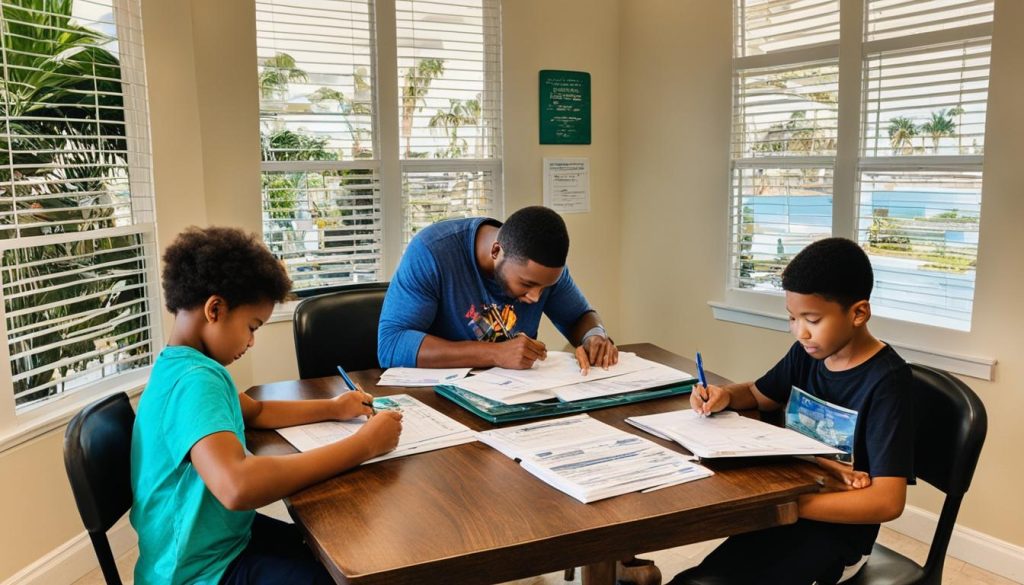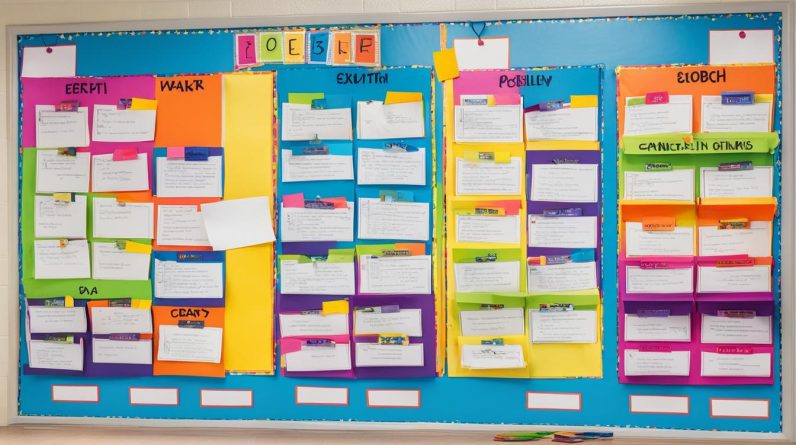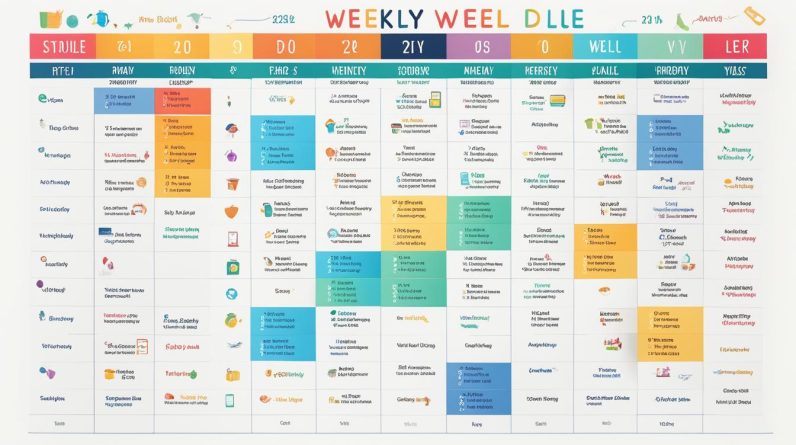When it comes to homeschooling in Florida, it’s crucial to be familiar with the state’s requirements and regulations. By understanding what is expected of you as a parent and educator, you can ensure compliance while providing a high-quality education for your child. In this comprehensive guide, we will explore the homeschooling laws, curriculum options, and essential tips for successful homeschooling in Florida.
Key Takeaways:
- Understanding Florida’s homeschooling laws and regulations is essential for homeschooling parents in the state.
- Florida does not require specific parent credentials or vaccinations for homeschooling.
- Parents must provide a Notice of Intent to the county’s Superintendent of Schools to legally homeschool in Florida.
- Record-keeping is important in Florida homeschooling, and parents must maintain a homeschool portfolio for each student.
- Annual evaluations are required to demonstrate educational progress, and there are various evaluation methods available.
Now, let’s delve deeper into the specifics of homeschooling laws, registration, record-keeping, evaluations, graduation requirements, and available resources in Florida. Whether you’re a first-time homeschooler or considering switching from traditional public school, this guide will provide you with the necessary information to start your homeschooling journey in Florida.
Understanding Florida Homeschooling Laws and Regulations
Homeschooling in Florida is governed by specific laws and regulations that parents must comply with. Unlike some other states, Florida does not have many requirements in terms of parent credentials for homeschooling. There is no minimum education level or criminal record ban for parents. Additionally, there are no vaccination requirements for homeschoolers, nor a list of required subjects that students must cover. However, Florida does require sequentially progressive instruction to satisfy the state’s compulsory education requirements. This instruction can be provided by the parent, a part-time attendance at a public or private school, hiring a tutor, or enrolling in correspondence courses. Homeschooled students in Florida must also be evaluated annually to show the progress they have made in their education.
It’s important to note that Florida homeschooling laws and regulations aim to ensure that students receive a quality education while allowing parents the flexibility to tailor the curriculum to their child’s needs and interests. By understanding these guidelines, parents can confidently navigate their homeschooling journey in Florida.
Sequentially Progressive Instruction
Florida homeschooling laws require that parents provide sequentially progressive instruction to satisfy the state’s compulsory education requirements. This means that the education provided must be structured and build upon previously learned concepts and skills. It ensures that students are making academic progress and are adequately prepared for future learning.
Evaluation of Progress
Annual evaluation is a crucial aspect of homeschooling in Florida. It allows parents to demonstrate the educational progress their children have made throughout the year. There are several methods of evaluation available, including:
- A certified Florida teacher’s review of the student’s portfolio
- A state-normed test administered by a certified Florida teacher
- A state-normed test administered at an approved testing center
- A state-approved psychologist’s assessment
- Any other evaluation method agreed upon by the parent and superintendent
The results of the evaluation must be submitted to the superintendent’s office.
“Education is not the filling of a pail, but the lighting of a fire.” – W.B. Yeats
Flexibility and Freedom
Florida homeschooling laws provide parents with the freedom and flexibility to tailor their child’s education. Without strict requirements for parent credentials or specific subjects to cover, parents have the freedom to choose a curriculum that aligns with their child’s interests, learning style, and educational goals. This allows for a personalized and engaging learning experience.
| Requirement | Details |
|---|---|
| Parent Credentials | No minimum education level or criminal record ban |
| Vaccination Requirements | None for homeschoolers |
| Required Subjects | No specific list of subjects |
| Sequentially Progressive Instruction | Parents must provide education that builds upon previously learned concepts and skills |
| Evaluation | Annual evaluation of student progress required |
Providing Notice of Intent in Florida
To legally homeschool in Florida, you need to follow the state’s requirements, which include providing a Notice of Intent to your county’s Superintendent of Schools. This simple step notifies the authorities of your decision to homeschool your children and ensures compliance with the law.
The Notice of Intent should include the following information:
- Names of the children being homeschooled
- Addresses of the children
- Birth dates of the children
It is recommended to either hand-deliver the notice or send it via certified mail to ensure proof of filing within 30 days of establishing your homeschool. This helps in maintaining a record of compliance with the state’s regulations.
Even if you decide to start homeschooling in the middle of a semester, you can still proceed as long as you follow the state guidelines and submit your notice of intent. It’s essential to meet this requirement to ensure that you are meeting all the necessary steps to legally homeschool in Florida.
By providing Notice of Intent, you establish a formal acknowledgment of your intention to educate your child at home and demonstrate your commitment to adhering to Florida’s homeschooling requirements.
Example Notice of Intent:
Dear [Superintendent’s Name],
I am writing to provide formal notice of my intent to homeschool my children in accordance with Florida laws and regulations. The details are as follows:
Name of Child 1: [Child’s Name]
Address: [Child’s Address]
Date of Birth: [Child’s Date of Birth]
Name of Child 2: [Child’s Name]
Address: [Child’s Address]
Date of Birth: [Child’s Date of Birth]
Thank you for your attention to this matter. If you require any additional information, please let me know.
Sincerely,
[Your Name]

Submitting the Notice of Intent is an important step in starting your homeschooling journey in Florida. It ensures that you are in compliance with state requirements and helps establish a positive relationship with the educational authorities.
Record-Keeping in Florida Homeschooling
As a homeschooling parent in Florida, it is essential to prioritize record-keeping to ensure compliance with state requirements and to keep track of your child’s educational progress. Establishing and maintaining a comprehensive homeschool portfolio is key to documenting your child’s learning journey.
The homeschool portfolio should include a variety of materials that showcase the educational activities and achievements of your child. This can include:
- A log of educational activities, outlining the subjects covered and the resources used.
- Samples of student work, such as completed assignments, projects, and exams.
- Documentation of field trips, extracurricular activities, and educational events attended.
- Evidence of any specialized or individualized instruction provided to meet your child’s unique needs.
While Florida law does not require attendance records, it’s still important to maintain a record of your child’s attendance for your personal reference and as a measure of their educational progress.
It’s important to note that the homeschool portfolio must be kept for two years and may be subject to review by the district school superintendent. However, unless specifically requested, there is no requirement to share the portfolio with the superintendent.
Having a well-organized and comprehensive homeschool portfolio not only ensures compliance with Florida homeschooling requirements but also serves as a valuable resource for monitoring your child’s growth, tracking their achievements, and preserving a record of their education.
Remember to regularly update and maintain the portfolio, adding new materials and removing outdated ones. This way, you’ll have a reliable record of your child’s homeschooling journey, which can be useful for future evaluations or college admissions.
Creating a visually appealing and informative portfolio is an excellent way to showcase the progress and accomplishments of your homeschooled child. It’s an opportunity to advocate for the effectiveness of homeschooling and highlight your child’s educational success.

Take a look at the example table below to understand how you can create an organized and visually pleasing record-keeping system:
| Date | Subject/Activity | Materials/Work Samples |
|---|---|---|
| January 5, 2022 | Math | Completed worksheets on multiplication |
| January 7, 2022 | Science | Experiment report and photos |
| January 10, 2022 | Field Trip | Brochure and photos from the museum visit |
By maintaining a well-documented portfolio, you can demonstrate your child’s educational progress and showcase their achievements to ensure a successful homeschooling experience in Florida.
Evaluating Homeschooled Students in Florida
Homeschooled students in Florida are required to be evaluated annually to demonstrate educational progress. This evaluation ensures that homeschooling parents are effectively providing their children with a quality education. Florida offers multiple methods of evaluation, allowing parents to choose the option that best suits their child’s learning style and preferences.
1. Certified Florida Teacher’s Review
One method of evaluation is a certified Florida teacher’s review of the student’s portfolio. This review involves an experienced educator assessing the student’s work samples, progress, and overall educational development. It provides valuable feedback and guidance to parents, helping them enhance their child’s learning experience.
2. State-Normed Test
Another evaluation option is a state-normed test administered by a certified Florida teacher. This test follows standardized norms and benchmarks, providing an objective measure of the student’s academic proficiency. It covers key subjects and learning objectives, ensuring that the student is meeting grade-level expectations.
3. Approved Testing Center
Parents can also choose to have their child take a state-normed test at an approved testing center. These centers have the necessary resources and expertise to administer and evaluate the test accurately. The results provide insights into the student’s academic strengths and areas for improvement.
4. State-Approved Psychologist’s Assessment
If parents prefer a more comprehensive evaluation, they can opt for a state-approved psychologist’s assessment. This assessment involves a qualified psychologist conducting a thorough evaluation of the student’s cognitive abilities, learning style, and academic progress. It provides a holistic view of the student’s educational needs.
5. Alternative Evaluation Methods
Additionally, Florida allows parents and superintendents to agree upon alternative evaluation methods. This flexibility caters to the unique circumstances and preferences of each homeschooling family. Alternative methods may include performance assessments, oral exams, or other forms of evaluation that both parties deem suitable.

“Evaluation is a valuable tool that ensures homeschooling in Florida meets educational standards and promotes student growth and development.”
Regardless of the chosen evaluation method, the results must be submitted to the superintendent’s office to fulfill the annual evaluation requirement. These evaluations provide accountability and assurance that homeschooled students in Florida are receiving a rigorous education.
Homeschool Graduation Requirements in Florida
As a homeschooling parent in Florida, you have the authority to determine the graduation requirements for your child. This allows you to tailor their education to their specific interests, goals, and future plans. However, it’s essential to conduct research and consider certain factors when establishing these requirements.
If your child plans to attend college or vocational school after graduation, it’s crucial to review the minimum entrance requirements for post-secondary institutions. By aligning your child’s education with these requirements, you can ensure that they are adequately prepared for their future academic pursuits.
One way to gain insight into common courses and tests considered by colleges and universities is to look at the guidelines followed by public school students in Florida. While you have the flexibility to design a personalized curriculum, it can be helpful to understand the expectations and benchmarks set by traditional educational institutions.
By carefully considering these factors, you can establish graduation requirements that not only meet your child’s educational needs but also set them up for success in their future endeavors.
Example Homeschool Graduation Requirements
To provide you with an idea of what homeschool graduation requirements in Florida might look like, here is an example of a sample set of requirements:
| Subject | Credits |
|---|---|
| English/Language Arts | 4 |
| Mathematics | 4 |
| Science | 3 |
| Social Studies | 3 |
| Foreign Language | 2 |
| Physical Education | 1 |
| Fine Arts | 1 |
| Electives | 4 |
Please note that this is just an example, and you have the flexibility to tailor the requirements to fit your child’s unique educational journey.
Remember to keep thorough records of your child’s coursework, grades, and any other relevant information to document their completion of the graduation requirements. This documentation may be useful when applying to colleges or presenting proof of education for future endeavors.

Overall, homeschooling in Florida provides families with the opportunity to create a customized education that meets their child’s needs and goals. By understanding the graduation requirements, you can ensure that your child is well-prepared for their next chapter, whether it’s pursuing higher education or entering the workforce.
Enrolling in Public School after Homeschooling
If you decide to transition your homeschooled child back into the public or private school system in Florida, you will need to submit a letter of termination to the school district superintendent. You may choose to provide any records you wish to the school to help determine your child’s grade level, but ultimately, it is up to the school principal to make that determination. Some schools may require additional placement testing upon registration.
Returning to public school after homeschooling can be an exciting and sometimes challenging transition for both parents and students. It’s essential to understand the process and requirements involved to ensure a smooth reintegration into the traditional school setting.
When enrolling your homeschooled child in public school, it’s important to follow these steps:
- Submit a letter of termination: Contact the school district superintendent and provide a letter stating your intention to enroll your child in public school. This letter serves as an official notice of termination of homeschooling and initiates the enrollment process.
- Provide records: While not mandatory, you may choose to share your child’s homeschooling records with the school to help determine their grade level and academic placement. This can include portfolios, transcripts, or any other relevant documentation.
- Meet with the school principal: Schedule a meeting with the principal to discuss your child’s educational background, goals, and any special considerations that may impact their transition. The principal will assess your child’s academic needs and determine the appropriate grade level placement.
- Additional testing if required: Some schools may require additional placement testing to assess your child’s proficiency in certain subjects or to determine their academic readiness for their new grade level.
- Complete the enrollment process: Once your child’s grade level is determined and any necessary testing is completed, you will need to complete the enrollment paperwork and provide any additional documentation required by the school.
Enrolling your homeschooled child in public school can be a great opportunity for them to experience a different learning environment, interact with peers, and access additional resources and extracurricular activities offered by the school. However, it’s important to be prepared for potential challenges during the transition, such as adapting to a structured classroom setting, adjusting to a new routine, and meeting new academic expectations.
Exploring Homeschooling Options in Florida
When it comes to homeschooling in Florida, families have a range of options to consider for their child’s education. Whether you prefer to create a personalized curriculum or utilize online homeschooling programs, there are choices available to suit your family’s needs. Many families also explore non-traditional private schools, known as umbrella schools, to navigate homeschool regulations in the state. Each option has its advantages and considerations, allowing you to find the best approach for your child’s educational journey.
Creating Your Own Curriculum
One option is to create your own homeschool curriculum tailored to your child’s unique interests and learning style. This approach allows for flexibility and customization, giving you the opportunity to focus on specific subjects or incorporate hands-on learning experiences. However, it requires careful planning and research to ensure that you cover all necessary topics and meet state educational standards.
Online Homeschooling Programs
Another popular option is to enroll in online homeschooling programs. These programs offer a structured curriculum with online lessons and resources that allow students to learn at their own pace. Online homeschooling programs often provide interactive activities, assessments, and support from qualified teachers. This option can provide a comprehensive education while offering flexibility and convenience for both students and parents.
Umbrella Schools
Umbrella schools, also known as private schools of choice, provide an alternative option for homeschooling families in Florida. These schools act as a legal entity where parents can enroll their children and comply with homeschool regulations. By joining an umbrella school, families may have more flexibility in curriculum choices and may be exempt from certain reporting requirements. However, it’s important to thoroughly research and choose a reputable umbrella school that aligns with your educational goals.
“Homeschooling in Florida offers families various options, ranging from creating a personalized curriculum to enrolling in online programs or umbrella schools. Each option allows for flexibility and customization, ensuring that parents can tailor their child’s education to meet their unique needs and learning style.”
As you explore homeschooling options in Florida, consider the individual needs and learning style of your child. Whether you choose to create your own curriculum, utilize online homeschooling programs, or enroll in an umbrella school, the key is to find an approach that fosters a love of learning and provides a quality education.
| Option | Advantages | Considerations |
|---|---|---|
| Create Your Own Curriculum |
|
|
| Online Homeschooling Programs |
|
|
| Umbrella Schools |
|
|
By considering these options and exploring what works best for your family, you can create a homeschooling experience that engages your child and sets them up for success in their education.
Additional Resources for Homeschooling in Florida
For further information on homeschooling in Florida, there are additional resources available. A2ZHomeschooling.com provides comprehensive information on home education rules specific to Florida. Additionally, Sonlight Curriculum, Ltd. is a trusted source for homeschooling materials and offers a free catalog to browse their literature-based curriculum and academic products.
Getting Started with Homeschooling in Florida
If you are considering homeschooling in Florida, it’s important to begin with a well-rounded understanding of the homeschooling requirements and regulations in the state. By familiarizing yourself with the process of legally homeschooling, record-keeping, evaluations, and graduation requirements, you can confidently embark on your homeschooling journey in Florida.
Before diving into the world of homeschooling, take the time to learn about the Florida homeschooling requirements for parents. Knowing what is expected of you as a homeschooling parent will help ensure you stay compliant with the law and provide a quality education for your child.
Legal Requirements
First and foremost, you need to be aware of the legal requirements for homeschooling in Florida. While the state does not have strict regulations regarding parent qualifications or curriculum, there are still a few key things to keep in mind.
Florida law requires that you provide education that is sequentially progressive and covers the major areas of study, such as language arts, mathematics, science, social studies, and health education.
Additionally, you must submit a Notice of Intent to your county’s Superintendent of Schools, indicating your intention to homeschool your child. This notice should include the names, addresses, and birth dates of the children you will be homeschooling.
Record-Keeping
To ensure compliance with Florida homeschooling requirements, it’s crucial to maintain detailed records of your homeschooling journey. Keeping a comprehensive portfolio that includes educational activities, samples of student work, and any other relevant materials is essential.
In addition to the portfolio, it’s a good idea to document attendance, field trips, and any other educational experiences your child engages in. While attendance records are not required by law, having them on hand can be helpful if ever requested.
Evaluations
Florida law mandates that homeschooled students be evaluated annually to demonstrate educational progress. There are various evaluation methods to choose from, including a review of the student’s portfolio by a certified teacher, state-normed tests administered by a certified teacher or at an approved testing center, or an assessment by a state-approved psychologist.
The results of the evaluation must be submitted to the superintendent’s office as proof of your child’s educational progress.
Graduation Requirements
If your homeschooled student plans to graduate from high school, it’s important to set graduation requirements in line with post-secondary institution entrance requirements. Researching the minimum requirements for college or vocational school admission will ensure your child is prepared for their future academic endeavors.
Remember, as the homeschool administrator, you have the freedom to determine your own graduation requirements. However, it’s beneficial to align them with common courses and tests followed by public school students in Florida.
Homeschooling Requirements Checklist
| Requirement | Description |
|---|---|
| Notice of Intent | Submit a Notice of Intent to your county’s Superintendent of Schools to indicate your intention to homeschool. |
| Sequentially Progressive Instruction | Provide education that covers major areas of study and is sequentially progressive. |
| Record-Keeping | Maintain a detailed portfolio of educational activities, student work, and attendance records (optional). |
| Evaluation | Choose an evaluation method, such as a portfolio review or standardized testing, and submit the results to the superintendent’s office. |
| Graduation Requirements | Determine graduation requirements aligned with post-secondary institution entrance requirements. |
Homeschooling vs. Traditional Public School in Florida
Homeschooling offers an alternative to traditional public school education in Florida. By homeschooling, you have the freedom to customize the curriculum to meet your child’s specific needs and learning style. This personalized approach allows for a more focused and individualized learning experience.
With homeschooling, you have the flexibility to choose the teaching methods, resources, and materials that align with your child’s interests and strengths. You can tailor the pace of instruction, spending more time on challenging subjects and providing additional support where needed. This personalized approach can foster a deeper understanding of the material and promote a love for learning.
Furthermore, homeschooling allows for a more flexible schedule. You have the ability to create a learning routine that suits your family’s needs, incorporating field trips, extracurricular activities, and real-world experiences into your child’s education.
However, it’s important to carefully consider the advantages and challenges of homeschooling before making the decision to homeschool in Florida. While homeschooling offers numerous benefits, it also requires a significant commitment of time, energy, and resources from parents. You will be responsible for planning and implementing the curriculum, providing instruction, and assessing your child’s progress.
Quote: “Homeschooling allows parents to create an optimal learning environment that fosters their child’s individual growth and development.” – Jane Smith, Homeschooling Parent
Another aspect to consider is socialization. Homeschooled children may have fewer opportunities for daily interactions with peers compared to students in a traditional school setting. However, there are various ways to address this, such as participating in homeschool co-ops, joining local sports teams or clubs, and engaging in community activities.
Ultimately, the decision to homeschool in Florida depends on your child’s unique needs, your family’s values, and your ability to meet the requirements set forth by the state. It can be a fulfilling and rewarding educational option for families, but it requires careful consideration and planning.
Comparing Homeschooling and Traditional Public School in Florida
| Homeschooling | Traditional Public School | |
|---|---|---|
| Curriculum | Customizable to suit individual needs and learning styles. | Standardized curriculum mandated by the state. |
| Schedule | Flexible and can be tailored to fit family routines and activities. | Fixed schedule determined by the school. |
| Teaching | Parents or chosen instructors deliver instruction. | Certified teachers provide instruction. |
| Socialization | Opportunities for socialization may require additional effort and involvement in co-ops and community activities. | Daily interactions with peers are readily available. |
| Individual Attention | One-on-one attention and personalized instruction. | Classroom setting with larger student-to-teacher ratios. |
| Evaluations | Annual evaluations determined by the parent or approved evaluator. | Regular assessments and standardized testing. |
Conclusion
Homeschooling in Florida offers families the freedom to customize their child’s education according to their unique needs. By familiarizing themselves with the homeschooling requirements and regulations established by the state, parents can confidently embark on their homeschooling journey in Florida. With diligent record-keeping, proactive evaluations, and adherence to graduation requirements, homeschooling can be a fulfilling and successful educational choice for families across the state.
Florida homeschooling requirements empower parents to provide a personalized and tailored learning experience for their children. By taking advantage of the flexibility and control that homeschooling offers, families can create an education that aligns with their values and allows students to thrive academically, emotionally, and socially. Remember to stay informed about any updates or changes to the homeschooling laws in Florida to ensure compliance and a smooth homeschooling experience.
As you embark on your homeschooling journey in Florida, make use of the available resources to support your homeschooling efforts. Websites like A2ZHomeschooling.com provide valuable information on the specific homeschooling laws and regulations in Florida, while Sonlight Curriculum, Ltd. offers a range of homeschooling materials and curricula to enhance your child’s learning experience. Remember, with dedication, organization, and a passion for education, your homeschooling venture in Florida can be a rewarding and enriching experience for both you and your child.
FAQ
What are the requirements for homeschooling in Florida?
Florida does not have specific requirements for the parent’s education level or criminal record. However, sequential progressive instruction and an annual evaluation of the student’s progress are required.
How do I notify the county about my intent to homeschool in Florida?
You must provide a Notice of Intent to your county’s Superintendent of Schools within 30 days of establishing your homeschool. It should include the names, addresses, and birth dates of the children being homeschooled.
What records do I need to maintain while homeschooling in Florida?
It is essential to maintain a homeschool portfolio for each student, which should include a log of educational activities, samples of student work, and any other relevant materials.
How are homeschooled students in Florida evaluated annually?
Homeschooled students can be evaluated through a certified Florida teacher’s review of their portfolio, a state-normed test administered by a certified Florida teacher, a state-normed test at an approved center, or a state-approved psychologist’s assessment.
Can homeschoolers in Florida receive a valid diploma upon graduation?
Yes, parents can award a valid homeschool diploma upon graduation. However, it’s important to consider the minimum entrance requirements for post-secondary institutions if your child plans to attend college or vocational school.
Can my homeschooled child transition back to public school in Florida?
Yes, you can transition your homeschooled child back to public school by submitting a letter of termination to the school district superintendent. The school principal will determine the grade level and may require placement testing.
What curriculum options are available for homeschooling in Florida?
Parents in Florida have the flexibility to create their own curriculum, use online homeschooling programs, or choose non-traditional private schools known as umbrella schools.
Are there additional resources for homeschooling in Florida?
A2ZHomeschooling.com and Sonlight Curriculum, Ltd. are trusted resources for homeschooling in Florida. A2ZHomeschooling.com provides comprehensive information on homeschooling rules specific to Florida, while Sonlight offers a literature-based curriculum and educational products.
How do I get started with homeschooling in Florida?
Familiarize yourself with the homeschooling requirements and regulations in Florida, including notice of intent, record-keeping, evaluations, and graduation requirements. This will help you confidently begin your homeschooling journey.
What are the advantages of homeschooling compared to traditional public school in Florida?
Homeschooling offers flexibility, customization, and a focused learning environment tailored to your child’s individual needs and learning style.






